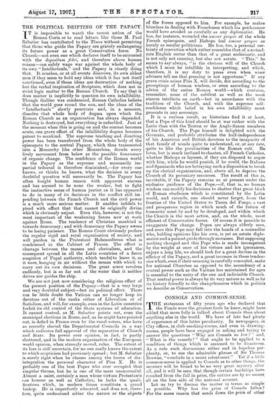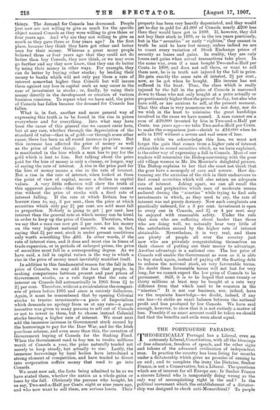CONSOLS AND COMMON-SENSE.
THE statesman of fifty years ago who declared that the Funds were the greatest fools he knew, might have added that more folly is talked about Consols than about anything else in the world. We have of late had plenty of experience of this latter peculiarity. In newspapers, in City offices, in club smoking-rooms, and even in drawing- rooms, people- have been engaged in asking and trying to answer the questions " Why are Console so low ?'" ana, " What is the remedy?" that ought to be applied to .a condition of things which is assumed to lie disastrous, As a rule such, discussions either end in hopeless per- plexity, or, to use the admirable phrase of Sir Thomas BrOwne,," conclude in a moist relentinent." Yet if a little' common-sense is applied to Consols as to other things, the mystery- will be found to be no very great mystery after all, and it will be seen that though certain hardships have resulted from the fall in price, the entries are by no means, all on the logs side of the national account. Let us try to discuss the matter in terms as simple as posSible. Why has the price of Consols fallen? For the same' reason that-sends down the price of other `things. The demand for Consols has decreased. People just now are not willing to give as much for the specific object named Consols as they were willing to give three or four years ago. And why are they not willing to give as much as they gave three or four years ago ? In the first place, because they think they have got other and better uses for their money. Whereas a great many people believed three or four years ago that they could not do better than buy Consols, they now think, or we may even go further and say they now know, that they can do better by using their money in other ways. For example, they can do better by buying other stocks; by lending their money to banks which will not only pay them a rate of interest somewhat higher than Consols but will insure them against any loss in capital such as may occur in the case of investment in stocks ; or, finally, by using their money directly in the development or creation of various business concerns. To repeat what we have said, the price of Consols has fallen because the demand for Consols has fallen.
What is, in fact, another and more general way of expressing this truth is to be found in the rise in prices everywhere and for everything. Into what may have been the cause of this general rise we cannot enter here, but at any rate, whether through the depreciation of the standard of value—that is, of gold—or through some other cause, there has been an all round increase iu prices. But this increase has affected the price of money as well as the price of other things. Now the price of money is manifested in the hire which a man has to pay for the gold which is lent to him. But talking about the price paid for the hire of money is only a clumsy, or longer, way of saying the rate of interest. A rise in the price paid for the hire of money means a rise in the rate of interest. But a rise in the rate of interest, when looked at from the point of view of capital, means a decline in capital values. A very little reflection will show the truth of this apparent paradox—that the rate of interest cannot rise without the price of stocks with a fixed rate of interest falling. If the rate at which Britain has to borrow rises to, say, 3 per cent., then the price at which securities which only pay 21 per cent. are sold must fall in proportion. Nobody is going to met 1 per cent. less interest than the general rate at which moneycan be hired in order to keep up the price of Consols. Therefore, when we say that a man can now get 3 per cent. for his money on the very highest national security, we are, in fact, saying that 2i per cent. stock is under present conditions only worth something like £83. In other words, if the rate of interest rises, and it does and must rise in times of trade expansion, or in periods of enlarged prices, the price of securities must fall in a corresponding degree. As we have said, a fall in capital values is the way in which a rise in the price of money must inevitably manifest itself.
In addition to this fundamental reason for the fall in the price of Consols, we may add the fact that people, in making comparisons between present and past prices of Government stocks, as a rule forget that the rate of interest on Consols fell automatically in 1905 from 2/ to 21 per cent. Therefore, without a recalculation the compari- son of prices before 1905 and since is entirely fallacious. Again, it must be remembered that by opening Colonial stocks to trustee investments—a piece of Imperialism which demands no apology from us at any rate—a great incentive was given to many persons to sell out of Consols or not to invest in them, but to choose instead Colonial stocks bearing a higher rate of interest. We must next add the immense increase in Government stock caused by the borrowings to pay for the Boer War, and for the Irish purchase scheme, and even more than this, the cessation of Government buying of Consols for the Sinking Fund. When the Government used to buy ten to twelve millions -worth of Consols a year, the price naturally tended not merely to keep steady, but actually to rise. Lastly, the immense borrowings by local bodies have introduced a strong element of competition, and have tended to divert into corporation coffers money that used to go into Console.
We must now ask, the facts being admitted to be as we have stated them, whether the nation as a whole gains or loses by the fall. Obviously the persons who bought, let us say, Two-and-a-Half per Cents. eight or nine years ago, and who now want to sell them, are serious losers. Their property has been very heavily depreciated, and they would get to-day in gold for £1,000 of Consols nearly £200 less than they would have got in 1899. If, however, they did not buy their stock in 1899, or in the ten years previously, but in the " seventies " or early " eighties, they cannot in truth be said to have lost money,-unless indeed we are to count every variation of Stock Exchange priees of security as losses and gains. In reality, they are only losses and gains when actual transactions take place. In the same way, even if a man bought Two-and-a-Half per Cents. in 1899, and does not sell them, or want to sell them now, he is in truth not injured by the fall in price. He gets exactly the same rate of interest, 2i per cent., now, as he got when he bought. His income has not suffered in the least. Thus, the class which is really injured by the fall in the price of Consols is narrowed down to those who not only bought at a price actually or proportionately higher than the price of to-day, but also who have sold, or are anxious to sell, at the present moment. That this class is very numerous we do not deny, nor do we wish in the least to minimise the great hardships involved in the cases we have named. A man cannot see a sum of £20,000 invested by him in Two-and-a-Half per Cents. ten years ago—we take Two-and-a-Half per Cents. to make the comparison just—shrink to £18,000 when he sells in 1907 without a severe and real sense of loss.
But while we acknowledge this loss, we must not forget the gain that comes from a higher rate of interest obtainable in sound securities which, as we have explained, is the other way of expressing a fall in Consols. Most of our readers will remember the Bishop conversing with the poor old village woman in Mr. Du Maurier's delightful picture, The Bishop explains to her that she must not think that the poor have a monopoly of care and sorrow. How dis- tressing are the anxieties of the rich in their endeavours to find sound securities which will also return an adequate rate of interest. Joking apart, we can all recall the worries and perplexities which men of moderate means endured during the " nineties " while trying to find safe investments in which, as they used to say, the rate of interest was not purely derisory. Now such complaints are practically unheard, for a 3 per cent. investment is open to every one in Consols, and 31 or '4 per cent. may be enjoyed with reasonable safety. Under the rule that men who are suffering shout louder than those who are doing well, we naturally hear very little of the satisfaction caused by the higher rate of interest obtainable. Nevertheless, it is very real, and there are plenty of people all over the country just now who are privately congratulating themselves on their chance of putting out their money to advantage. Another advantage is a national one. The low price of Consols will enable the Government as soon as it is able to buy stock again, instead of paying off the floating debt to redeem the national stock, on very favourable terms. No doubt these favourable terms will not last for very long, for we cannot expect the low price of Consols to be permanent. Still, it is to be hoped that some twenty or thirty millions at least may be bought at a rate very different from that which used to be common in the "nineties." It is not our business, nor, indeed, have we the requisite knowledge—we. doubt, indeed, if any one has—to strike an exact balance between the national profit and loss produced by low Consols. We have said enough, however, to show that it is not entirely a; matter of loss. Possibly if an exact account could be taken we should find that the benefits and evils were about equal.



































 Previous page
Previous page